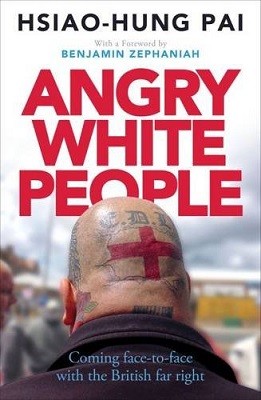By total coincidence, my hold on Angry White People came in the same week that Jo Cox was assassinated in England, apparently for her support of Britain’s presence in the EU and other liberalish political agendas. I heard the name “Nigel Farage” for the first and second times in this book and the news (respectively? not respectively? I don’t remember).

The real reason I put a hold on it in the first place was that I’m interested in what makes people choose one belief over another one. I try — I do try — to ground my own beliefs in data, as far as possible. Except that I know this isn’t how actual people actually manage their politics.1 I know that really people choose their beliefs based on what ethos aligns most comfortably with the type of person they want to be, or, if you ask Cynical Jenny, with the type of person they want to appear to be. And it is therefore really hard for me to understand why people choose far-right ideologies like the BNP or the rhetoric of Donald Trump, because surely nobody wants to look like or be a basically-Nazi.
Angry White People is about that. Hsiao-Hung Pai talks to men2 who have embraced the far-right mindset, though the degree to which her interviewees have committed to it varies widely. Some have become alarmed by the rhetoric of groups like the EDL (English Defence League, it’s racist, they hate Muslims) and are phasing out their involvement, while others have only grown stronger in their belief that immigrants are ruining England, garnering all the benefits, and taking all the jobs.
Reading about virulent racism in England is (depressing but) interesting because it highlights the way certain narratives about members of a given ethnic group, race, religion, etc., can come to seem urgent, true, and powerful despite clear statistical evidence to the contrary. America remains mightily under the sway of the Moynihan report and its narrative of broken black families and absent black fathers; even though the CDC has shown that black fathers actually spend more time daily with their children than fathers of other races. And when you live in America, it’s easy to lose track of whether or not that narrative is true, because you hear it so often that it continues to feel true.

In England, by contrast, there is this narrative that Muslim men are pedophiles and that they groom young girls (white girls sometimes! and kidnap them!) and share them around sexually at their mosques or whatever. I had never heard of this narrative before and was astonished to discover it in Angry White People. Immediately afterward, I encountered this same narrative both in Brexit coverage and in Sathnam Sangera’s Marriage Material, so it is definitely A THING over there. Americans, who are none too friendly towards Muslims ourselves, do not have this narrative. So it was a good reminder again of the way these narratives build and reproduce themselves out of free-floating prejudice and the desire to have a good reason to dislike a group you wanted to dislike anyway.
Also a great reminder to be suspicious of won’t someone save the children/womenfolk arguments. If you ever find yourself making an argument against a given group, and your argument is based on we must save their children/women!, just know that you are standing in a proud line of colonialist/racist rhetoric that uses women’s rights to justify oppression and theft against marginalized groups standing in the way of more powerful groups achieving still yet greater economic gain. KNOW THAT ABOUT YOURSELF FIRST. Speak second. (Or never. Never is also fine, in this context.)
Y’all, I don’t know. I don’t know with this world right now. Can someone recommend me a nonfiction book about, like, nice people doing the right thing, and it turns out well for them? Is that a dumb thing to want?
- Apropos of which: Don’t you want to read The Myth of the Rational Voter? I do. It looks good. ↩
- And women, you say? No. Not really. Pai talks about women’s roles in the far right, but most of what she has to say is, women aren’t tremendously active in far-right groups like the EDL and the BNP. Here, permit me to fan you gently whilst you try to recover from the shock of this news. ↩